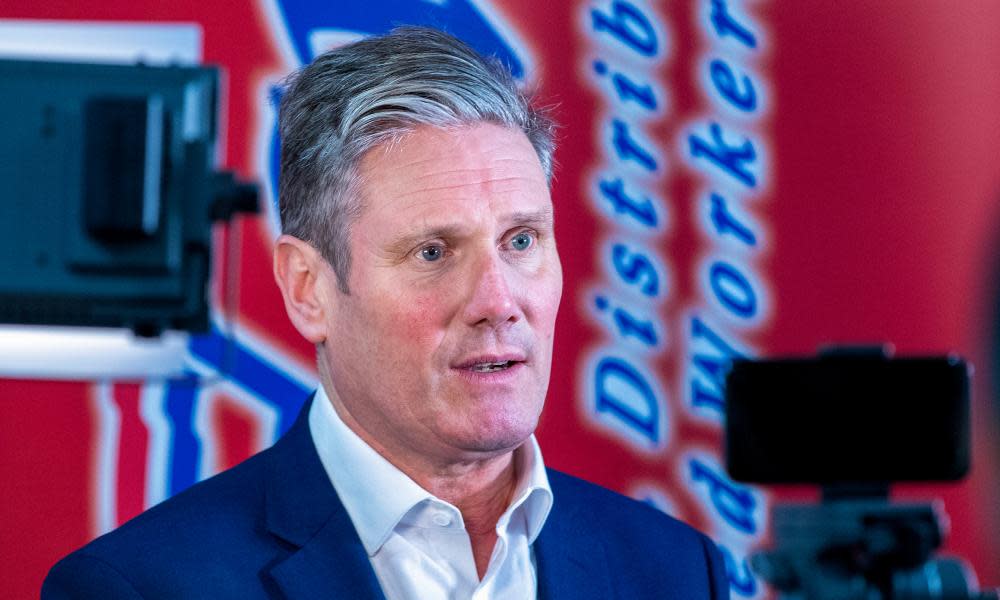Keir Starmer accuses Boris Johnson of 'doing a runner' on Huawei

Sir Keir Starmer has accused Boris Johnson of “doing a runner” over the decision on whether to allow Huawei a role in the UK’s 5G infrastructure, as Washington gave a final warning to the UK government over what it called a “momentous” choice.
Ahead of a likely decision on Tuesday, with the cabinet reportedly split and the Trump administration urging Downing Street to block any role for the Chinese telecoms firm, Starmer urged Johnson to make a statement to MPs in the Commons.
“There are so many questions that are unanswered,” Starmer, the favourite to win the race to become the new Labour leader, told Sky News. “He’s done a bit of a runner, has Boris Johnson, he’s not around and he’s not leading from the front. He needs to come to parliament, make a statement and face questions about this.”
Johnson is set to chair a meeting of the national security council on Tuesday to reach a final decision on Huawei, following a series of indications from Downing Street that they are likely to grant the Chinese firm a limited role.
Downing Street sources have said there is no other credible supplier for the infrastructure Huawei would provide, and that the US has been unable to suggest one.
US pressure on Johnson has ramped up, with the secretary of state, Mike Pompeo, who is due to visit the UK later this week, tweeting his support for a leading backbench Conservative MP who has urged the government to reject Huawei.
“The UK has a momentous decision ahead on 5G,” Pompeo said. “British MP Tom Tugendhat gets it right: ‘The truth is that only nations able to protect their data will be sovereign’.”
Tugendhat, who is seeking to reprise his role as the chair of the Commons foreign affairs committee, has warned that using a Chinese firm could cause security or back-door surveillance issues given Beijing’s approach to the rule of law and civil rights.
“It’s no good taking back control from Brussels only to hand it over to Beijing,” Tugendhat told BBC Radio 4’s Today programme on Monday. “And I’m sure that’s not what the government would want to do.
“This isn’t about the Americans – it’s simply about us. And, though I’m pleased to have the support of the US secretary of state, I would rather have the support of our secretary of state for culture, media and sport (Nicky Morgan) here to make a decision that I think is fundamentally in the British national interest.”
Huawei is a Chinese telecoms company founded in 1987. Officials in Washington believe the company poses a security risk because the Chinese government will make the firm engineer backdoors in its technology, through which information could be accessed by Beijing. Donald Trump has banned US companies from sharing technology with Huawei and has been putting pressure on other nations to follow his lead.
The UK has accepted there is some risk in working with Huawei, but security services do not believe it to be unmanageable. The UK government has agreed in principle to allow Huawei to be involved in building “non-core” parts of the UK’s 5G network. With a final decision expected within weeks, the head of MI5 had recently said he was confident the US-UK intelligence-sharing relationship would not be affected if London gave Huawei the nod.
Poland’s internal affairs minister, Joachim Brudziński, has called for the European Union and Nato to work on a joint position over whether to exclude Huawei from their markets, after an Huawei employee was arrested on spying charges.
Much of the doubt surrounding Huawei stems from founder Ren Zhengfei’s background in China's People’s Liberation Army between 1974 and 1983, where he was an engineer. His daughter, Huawei’s senior executive Meng Wanzhou, was arrested in Canada in December 2018 over allegations of Iran-sanctions violations.
Huawei insists it has never been asked to build any backdoor into its technology by the Chinese government and has offered to sign a “no spy agreement” with countries adopting it. The trade rivalry between the US and China has intensified in recent years and the firm believes the White House is simply using it as a weapon in that larger fight.
Tugendhat has previously called for Huawei to at the least have a limit imposed on how much involvement it can have in the 5G infrastrcture. On Monday, the Financial Times reported that the government was looking at a market cap as a possible compromise to placate the Americans.
Pompeo is due to meet Johnson and the foreign secretary, Dominic Raab, in London on Wednesday.
His tweeted warning follows a phone call between Johnson and Donald Trump on Friday, in which the leaders reportedly discussed the security of telecommunications networks.
Speaking on Radio 4’s The Westminster Hour on Sunday evening, the justice secretary, Robert Buckland, said the decision would be based on “our own sovereign right to choose”.
He said: “It’s Britain that will have to live with the consequences of that. There are risks but we will make an informed decision based on the evidence, and we will do so in an autonomous way.”
On Sunday, the home secretary, Priti Patel, reported as being one of the cabinet minister pushing for a rethink on Huawei, dismissed the idea she was leading a rebellion over the issue, or that using the Chinese firm could imperil continued intelligence-sharing with the US and others.
She told Sky News the reports were “not accurate”, adding: “My role is very much to protect the national security of our country and that also includes intelligence services and communications as well.
“We are having discussions, and rightly so, and those discussions remain at the national security council level and within cabinet level.”

 Yahoo News
Yahoo News 
